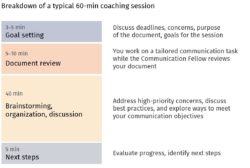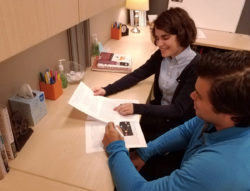You can meet with Fellows in person (in 24-216 or NW16-130) or virtually over Zoom. You’ll be able to make your selection when you book your appointment online.
The Communication Lab focuses on improving the writer, not the document. We use our technical and communication training (and our NSE experience at MIT) to give you customized feedback. Each session is centered around your goals, needs, and deadlines.
 |
 |
The Communication Fellows will meet you wherever you are in the writing process. You can come to us with just ideas floating in your head (brainstorming, getting started), or you can email us your document ahead of time if you are at the revision stage. Depending on the location, we may also offer you a snack and/or something to drink—anything to help you feel comfortable during your session!
What we do |
What we don’t do |
| We help with any technical task (presentation, journal article) or professional document (cover letter, diversity statement) that you may encounter in your career in NSE. We use strategic questions and direct feedback to help you think about communication as a process rather than a checklist.
Examples of prompts: [Data visualization] There is a lot of information in this cross section plot. Especially for a slide presentation, it could be overwhelming. What are you hoping to show here? [CV/resume] I notice you’ve listed your lab responsibilities here. Can you tell me a bit about your contributions as a UROP in Prof. Bucci’s group? [Grant proposal] In which ways did you demonstrate feasibility? Also, because this is for NEUP, we should highlight why this project is relevant to them. |
We avoid tasks that are beyond our training or that fall outside our educational model. Here are some services that we do not provide (but that we may flag in passing if needed):
|
Other useful resources at MIT include:
- The Writing and Communication Center (WCC): They are staffed by MIT lecturers who are published writers and experienced teachers. WCC provides one-on-one consultation on written and oral communication, and addresses all concerns ranging from structure to style, as well as English grammar.
- The Career Advising & Professional Development (CAPD): Their staff can help you with a wide spectrum of tasks including CV reviews, mock interviews, polishing your LinkedIn profile, and networking.
- The Office of Graduate Education (OGE): They offer numerous resources such as ways to gain teaching experience, information about fellowship opportunities for international students, and support for those pursuing a career in academia.
- Your own NSE librarian Alejandro Paz: If it takes you more than 5 minutes to find a source, just email him at apaz@mit.edu. He can help you find the most obscure references, including information you didn’t know you needed. If you’re starting a new research topic, he will also help you with your literature search.
- The English Language Studies (ELS): They offer writing courses for bilingual students, workshops on writing for science and engineering, and training in speaking and pronunciation.
